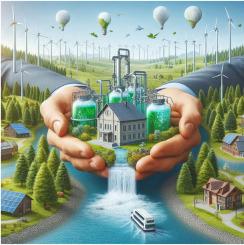Prospects for obtaining green hydrogen at mini-hydroelectric power plants for transport
IF 8.1
2区 工程技术
Q1 CHEMISTRY, PHYSICAL
引用次数: 0
Abstract
The use of hydrogen transport is an important step towards carbon neutrality. Unlike traditional transport running on hydrocarbon fuel, hydrogen cars do not hurt the environment during their operation. New green technologies for public transport deserve special attention since they are a key source of pollution in large cities. Achieving carbon neutrality is impossible without using new hydrogen technologies in all industries. Hydrogen, in its final form, should become the main fuel for transport (cars, buses, trains, and river vessels), which, unlike electric transport, is not limited by the speed of refueling.
Hydrogen energy in the process of its development faces a large number of tasks and challenges, such as the production of “environmentally friendly” hydrogen, namely “green”, which is in greatest demand during the transition to a carbon-free economy, as a result of the problems arising during the storage of hydrogen.
Russia has huge water resources and one of the promising, energy-efficient and economically inexpensive technologies is the production of hydrogen fuel at hydroelectric power plants. This study presents a scheme for producing green hydrogen at a mini-hydroelectric power station with subsequent use for public transport purposes. In the Russian Federation, various domestic companies are developing and designing hydrogen-fueled transport. In the near future, hydrogen public transport may become a good alternative to diesel buses.

运输用小型水力发电厂获取绿色氢的前景
氢运输的使用是迈向碳中和的重要一步。与使用碳氢化合物燃料的传统交通工具不同,氢燃料汽车在运行过程中不会对环境造成损害。新的绿色公共交通技术值得特别关注,因为它们是大城市的主要污染源。如果不在所有行业使用新的氢技术,实现碳中和是不可能的。最终形式的氢应该成为交通工具(汽车、公共汽车、火车和内河船只)的主要燃料,与电力运输不同,它不受加油速度的限制。氢能在发展过程中面临着大量的任务和挑战,例如,在向无碳经济转型的过程中,由于氢的储存过程中出现的问题,生产“环境友好型”氢,即“绿色”氢是需求量最大的。俄罗斯拥有丰富的水资源,水力发电厂生产氢燃料是一项很有前途、节能且经济廉价的技术。这项研究提出了一个在小型水力发电站生产绿色氢的方案,随后用于公共交通目的。在俄罗斯联邦,许多国内公司正在开发和设计氢燃料交通工具。在不久的将来,氢燃料公共交通可能成为柴油公共汽车的一个很好的替代品。
本文章由计算机程序翻译,如有差异,请以英文原文为准。
求助全文
约1分钟内获得全文
求助全文
来源期刊

International Journal of Hydrogen Energy
工程技术-环境科学
CiteScore
13.50
自引率
25.00%
发文量
3502
审稿时长
60 days
期刊介绍:
The objective of the International Journal of Hydrogen Energy is to facilitate the exchange of new ideas, technological advancements, and research findings in the field of Hydrogen Energy among scientists and engineers worldwide. This journal showcases original research, both analytical and experimental, covering various aspects of Hydrogen Energy. These include production, storage, transmission, utilization, enabling technologies, environmental impact, economic considerations, and global perspectives on hydrogen and its carriers such as NH3, CH4, alcohols, etc.
The utilization aspect encompasses various methods such as thermochemical (combustion), photochemical, electrochemical (fuel cells), and nuclear conversion of hydrogen, hydrogen isotopes, and hydrogen carriers into thermal, mechanical, and electrical energies. The applications of these energies can be found in transportation (including aerospace), industrial, commercial, and residential sectors.
 求助内容:
求助内容: 应助结果提醒方式:
应助结果提醒方式:


